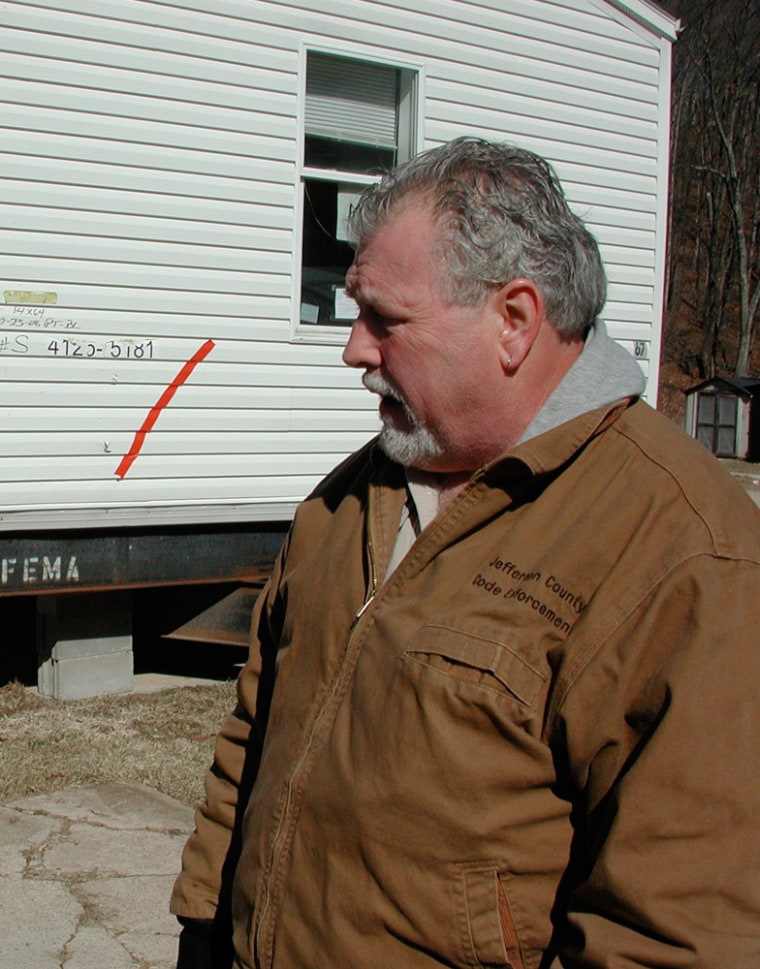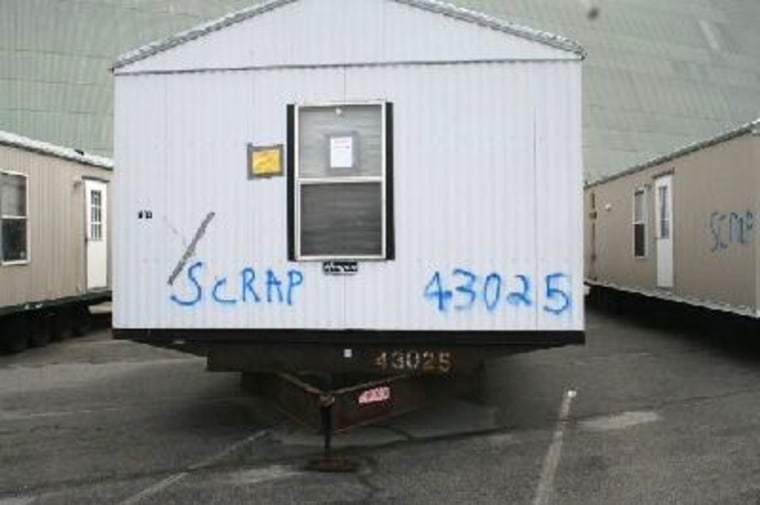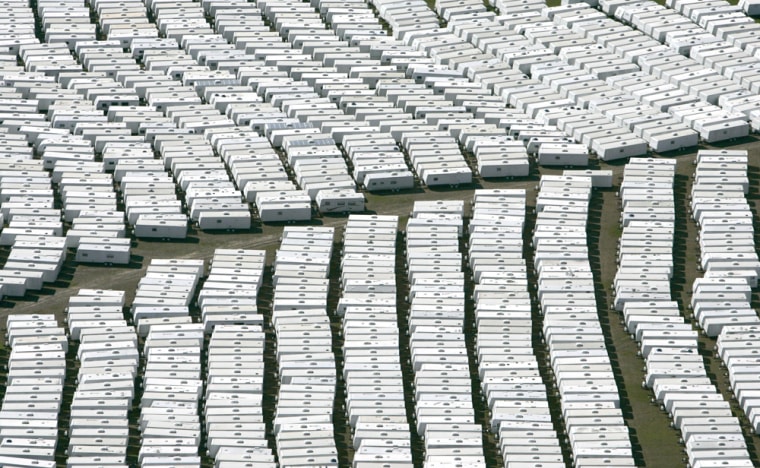As FEMA ponders whether to resume public sales of thousands of surplus travel trailers and mobile homes that once housed Gulf Coast hurricane victims, at least one purchaser has figured out a way around the suspension: Buying “scrap” units not intended for human habitation and then returning them to the housing pool.
And there are indications that he wasn’t the only one using the dodge before the agency moved to halt the practice.
The hurried purchase of tens of thousands of travel trailers and mobile homes after the twin disasters of Hurricanes Katrina and Rita in 2005 has been a headache almost from the start for the Federal Emergency Management Agency. That’s because many of the units also triggered headaches — and far worse — for the hurricane victims they were intended to shelter because they contained high levels of the airborne form of the industrial chemical formaldehyde.
That problem is at the center of a massive lawsuit expected to go to trial later this year, as nearly 40,000 plaintiffs seek damages from manufacturers of the units, four companies that installed them and the federal government. It also prompted FEMA to suspend sales of the travel trailers and mobile homes to the public in July 2007.
But now FEMA is finding that even getting rid of decommissioned travel trailers and mobile homes can be complicated.
The federal General Services Administration began auctioning off some of the FEMA units that had been declared as scrap — meaning they “have no value above the basic material content and repairs to maintain the unit are uneconomical” — in October. So far, 348 mobile homes and about 750 travel trailers have been auctioned through the GSA’s Web site, and agency officials estimate that another 4,000 or so currently are destined to be sold as scrap.
‘Not intended for habitation’
But although the word “scrap” is prominent on all sales information and documentation provided to purchasers, and the terms clearly indicate that the units are “not intended for habitation,” more than two dozen of the units have turned up in recent weeks at mobile home parks in Missouri and Georgia.
The problem came to light in early February, when John Webb, a building inspector for Jefferson County, Mo., arrived at the Robindale Mobile Home Park in Fenton, Mo., to inspect 13 mobile homes that had just been delivered.
“I talked to a guy on site who said, ‘We’re getting FEMA trailers, picking them up cheap,’” he told msnbc.com.

Webb, who was concerned because he had heard about the formaldehyde problem, then spoke with the park manager, who showed him the official paperwork for the homes.
“When I looked at the documents, they clearly said, ‘not to be occupied; for scrap only,’” Webb said. “But when I asked her about it, she said they (the park owners) had taken care of that.”
Webb checked with his bosses in the inspection department and with the state Department of Motor Vehicles and the Public Service Commission, which regulates manufactured housing, and was told the units could not be inhabited.
Instead, the PSC dispatched a team to remove labels from the homes indicating they were manufactured to the building standards and safety codes of the U.S. Department of Housing and Urban Development, effectively rendering them uninhabitable.
A second group of 19 former FEMA mobile homes found this week at the Arrowood Mobile Home Park in Grovetown, Ga., may also have been improperly detoured from the scrap heap. Richard Harmon, director of the Columbia County building department, said the units do not have the required HUD labels, which means that under state law they cannot be occupied, he said.
“We do not know if they are a part of what Jefferson County has for a fact,” he said Thursday. “What we do know is we have 19 manufactured homes that do not have HUD certification labels in them, so they are not allowed.”
New York company owns both parks
Both the Arrowood and Robindale parks are owned by KDM Development Corp. of Pittsford, N.Y., which states on its Web site that it operates 47 mobile home parks in 18 states. Officials of the company did not respond to phone calls from msnbc.com seeking comment.
But Gary Estes of Tallahassee, Fla., whose name is on a purchase order for 53 mobile homes bought in a GSA auction, told msnbc.com that he bought them at the behest of KDM officials and that they knew the units had been designated as “scrap” and were not intended for use as housing.
“I actually bought them for (KDM), and they got a copy of the certificate from the federal government that stated they were scrap,” he said.
But Estes said that FEMA also must have known that the scrap mobile homes and travel trailers auctioned by the GSA were going to buyers who were intending to live in them or rent them, given that they typically went for much more money than they could possibly be worth in raw materials.
“They know the public is buying these things and what the public is doing with these things,” said Estes, who paid $973,340 — or an average of about $18,365 apiece — for the 53 mobile homes he bought.
It is not clear whether KDM or Estes could be subject to any sanctions for attempting to use the scrap units for housing.
Why were HUD labels left on?
Nor is it known why the HUD labels were left on the units when they were sold for scrap, since that made it easier for them to be passed off as habitable.
FEMA spokesman Zachary Kittrie said that there is no federal requirement that the HUD decals be removed from a “unit designated as scrap,” but that in January, at HUD’s request, the agency began removing them from mobile homes prior to auction. FEMA also has been spray-painting the word “scrap” on the sides of units since December “to further reinforce the intent of sale,” he said.
Jeron Brown, a spokesman for HUD, said that removal of the labels should put a stop to the problem.
“That would dramatically reduce the possibility that one of these units could get resold as housing by some unscrupulous purchaser, since these labels are required by all lenders and local building departments,” he said.
Much of the concern about the units has focused on the well-publicized formaldehyde problem.
The federal Centers for Disease Control reported in February 2008 that levels of formaldehyde gas in 519 trailer and mobile homes it tested in Louisiana and Mississippi were — on average — about five times what people are exposed to in most modern homes. In some trailers, the levels were nearly 40 times customary exposure levels, raising fears that residents could suffer respiratory problems and potentially other long-term health effects, it said.
Formaldehyde is considered a human carcinogen, or cancer-causing substance, by the International Agency for Research on Cancer and a probable human carcinogen by the U.S. Environmental Protection Agency.
A ubiquitous chemical
It is used in a wide variety of products, including composite wood and plywood panels. There are no federal safety standards for formaldehyde fumes in homes or travel trailers, though HUD regulates the presence of the chemical in the manufacture of mobile homes. The Environmental Protection Agency also is currently taking public comment on whether it should regulate formaldehyde emissions.

The Missouri Public Service Commission seized on those concerns in a “consumer alert” issued Wednesday, which stated that the mobile homes discovered in Jefferson County “exceeded federal guidelines for formaldehyde.” The statement warned the owners of the mobile homes and the mobile home park that “legal action would be taken if there is any future attempt to sell, transfer or lease the contaminated homes for housing purposes.”
But a statement issued by FEMA late Wednesday indicated that formaldehyde levels are not a primary issue in determining whether units are declared to be scrap.
“Units are inspected and designated as scrap based upon a variety of criteria, including damage during transport, damaged roofing, flooring or wallboards, holes or other damages that make them not cost effective for repair," it said.
But Estes, the purchaser of the trailers, said he believes FEMA just wants to get rid of the problem, even though many of the units he bought appeared to be “brand spanking new.”
He also argued that the agency has continued to provide mobile homes to disaster victims in the Midwest and California — units that he says are nearly identical to those designated for the scrap heap.
“Writing ‘scrap’ on the side does not make it scrap,” he said. “… I’m not trying to hurt anybody. I’m trying to make a living like everybody else and do the best I can.”
